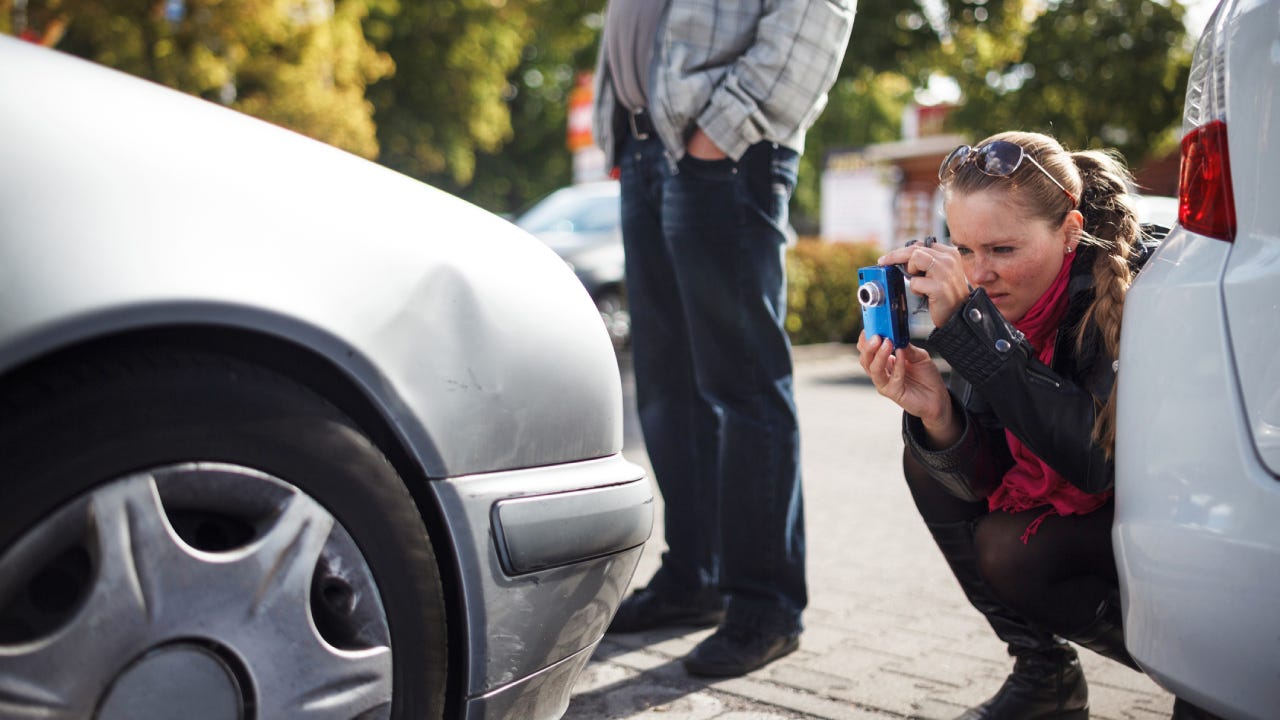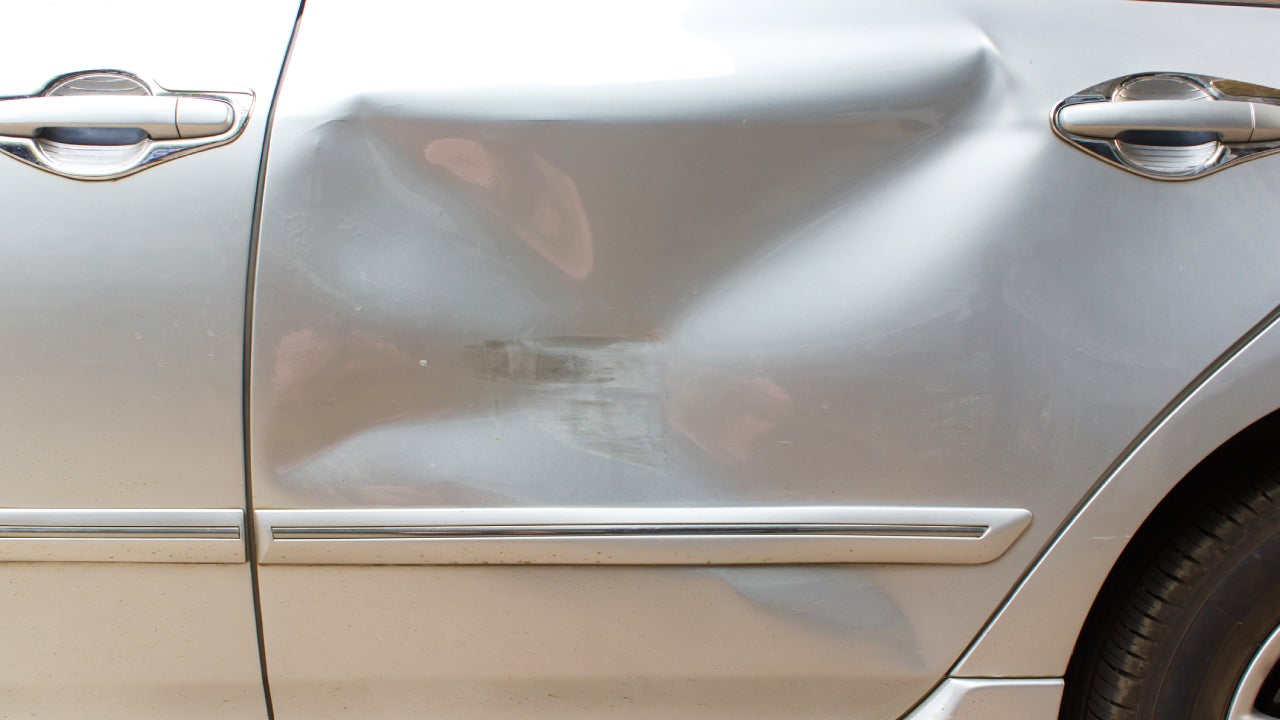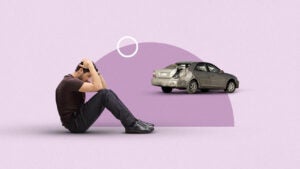7 Steps to take after a car accident

Car accidents are part of life — a costly one. The National Safety Council (NSC) estimates that of the 235 million drivers licensed in the U.S., approximately one in 20 was involved in a motor vehicle accident, with average costs ranging from $6,000 to $1 million or more depending on the severity of the crash. While safe driving habits can help reduce your chances of an accident, it’s just as important to know how to react after a crash in order to minimize your costs and prepare for a successful insurance claim.
1. Be prepared for an accident
Financial preparation for a car accident starts with a strong auto insurance policy. If you’re not sure what coverage you have on your vehicle, review your policy and adjust your selections if necessary to ensure you have the right financial protection. If you only carry your state’s minimum required coverage, you may want to increase your liability limits, which will reduce your potential out-of-pocket responsibility for other drivers’ costs, or add collision coverage, which will allow you to file a claim for damage to your own car.
In the event of a car accident, it’s important to have all the necessary insurance information on hand. This will make navigating the accident process—including filing a claim—more efficient. You’ll also want to carry basic safety equipment with you to document the scene and ensure visibility. This typically includes:
- Flashlight and high visibility safety vest
- First aid kit, including protective shoes and warm clothing
- Proof of insurance in a digital or physical format
- Proof of registration
- Your insurance company’s contact information
- Pen and paper to write down details of the scene
- A camera to document damage
2. Make sure everyone is safe, then call the police
“Obviously the first thing you want to do is make sure everyone involved is OK,” says Kip Diggs, a spokesperson for State Farm Insurance. If anyone has serious injuries, dial 911 for an ambulance. Regardless, move the vehicles out of traffic to avoid another accident.
You might have heard that you don’t need to call the authorities if the crash was minor, but experts advise calling the police after any type of car accident. “Even if the other person says, ‘I’ll take care of you; I’ve got a brother-in-law with a body shop that can fix your car,’ you still want to call,” says Beth Hanlon, an agent for Allstate Insurance in Riverhead, New York.
This provides an extra measure of protection for everyone involved, and a police report will act as an official record of the accident. If the accident happens on an interstate highway, call county or state law enforcement.
If the accident is minor, without injury or much damage, the officer will typically just file an incident report, which functions as an information exchange. If the crash is more serious, the officer will create an accident report to assist the insurance process and establish legal liabilities.
Be aware that if it is a minor accident, police officers may not always come to the scene. “We don’t dispatch a police car to every fender bender,” says James Kenneally, a Boston police officer. “We can’t afford to, given our limited resources.”
3. Call your insurance company
Most insurance experts suggest calling your car insurance company regardless of the accident’s severity.
However, Michael Gutter, assistant professor of family financial management at the University of Florida, says there are cases in which it may not be a good idea to involve your insurer. In some cases, state law forbids insurance companies from raising rates unless the insured was at fault, he points out. “But if you aren’t protected from rate hikes, I can see why someone would think twice (about calling his/her insurance company) if it’s just a fender bender.”
If the insurance company does need to be notified, call them as soon as possible. “Sometimes our customers will be in an accident, and the other guy will call first. That raises eyebrows,” says Hanlon. “Within a day, you should let your insurance company know.”
Never trust the other driver! Even if the other driver says they aren’t going to call their insurance company, they still might. That happened to me — the other driver said our fender bender was so minor that they didn’t want to involve insurance, but a month later I got a call from my insurance company that they put in a claim. It’s usually a good idea to inform your insurance company after an accident, especially if there’s any damage. In this situation, you have to look out for yourself.— Lisa McArdle, Editor, Bankrate
4. Gather and exchange insurance information
Car accidents can be stressful, and it may be difficult to recall information about the event as days and weeks go by. Gathering all relevant information at the scene is one of the most important steps to take after a car accident. Later on, it may even help make the claims process easier. This could include:
- Taking photos at the scene: Take photos of all vehicles involved from all sides. Include photos with surrounding area markers, like road or traffic signs, traffic lights and other identifying markers.
- Exchanging insurance information: Write down the other driver’s name, contact information, insurance company name and policy number. If they have proof of insurance, it may be easier to take a photo. If they cannot produce insurance information, it may be a good idea to call the insurance company from the scene to verify coverage.
- Writing down details while they’re still fresh: The insurance company will ask questions to understand what happened before and during the car accident. Make note of what direction you were traveling and the street you were on. Where did the impact occur and how did it occur? You could also draw a picture or do a voice recording if that’s easier.
- Getting witness information: If there are witnesses that saw the fender bender, get their name and contact information to provide to the insurance company. Witnesses may help corroborate your accident report and verify what happened. If police arrive on the scene, they may also do this.
Be mindful of liability
Conversation with the other driver should probably be limited to exchanging insurance and contact information. “Don’t answer questions or make statements,” Gutter says. If the police were called to the scene, answer their questions honestly. Whether you live in an at-fault or no-fault state determines who decides liability and fault after the accident. It is generally recommended to not admit guilt and instead let the insurance companies make the decision.
“I got into an accident when I was 17 because I went the wrong way down a one-way street,” says Natalie Todoroff, a writer on Bankrate’s insurance editorial team. “I was so scared and felt so bad that I assumed fault at the scene, which you’re never supposed to do. I got a firm talking-to from my dad after that.”
5. Determine if a claim needs to be filed
You may not need to file a claim if the overall damage is not significant and no damage is done to the other person’s car. If, for example, there is $500 worth of damage to your car and your deductible is $1,000, it may not make sense to file a claim.
In some cases, most insurance professionals recommend that your insurance company be involved. These include:
- When there are any injuries, no matter how minor they might seem. It is impossible to predict how expensive the medical bills might be, and there is also the possibility of legal action being taken against you.
- If the damage is significant or either car is totaled.
- If it is unclear where the blame lies and the police report is inconclusive. This may be particularly true with parking lot accidents, where there may not be stop signs or lane markings to make it clear who has the right of way.
- You are deemed at fault for the accident.
In short, it is a good idea in most cases to let your insurance company know about any accidents since their job is to help keep you protected.
Keep in mind that you can’t make changes to your insurance coverage after an accident in order to file a claim for damage that otherwise wouldn’t be covered. This is a form of insurance fraud and could get you in serious trouble.
6. Keep track of repairs, appointments and expenses
It is usually wise to stay involved throughout the repair process when your car has been involved in an accident. You may not have a lot of options in terms of where your car is taken and how damage is fixed, but keeping track of necessary repairs and how they are done may help ensure the work is high quality. For example, you may want to ensure that the mechanic is using original manufacturer parts.
It is also important to let the insurance companies handle any discussions with the other driver after an accident.
If the other driver’s insurance company contacts you, refer them to your insurance company. “While you are not required to cooperate with the other party’s insurance company, your claims representative will discuss the best way to handle your claim, which may include cooperating with the other party’s carrier,” says Burklin.
Lastly, keeping receipts of all repair work and medical expenses may also be helpful. Keeping track of appointments, medical treatment and resulting costs may help ensure you get repaid in full for eligible expenses. Having proof of repairs may also prove helpful if there is an issue with repair work in the future or you sell the car so that you can pass the information along to the new owner, for example.
7. Evaluate your car insurance rates
After an accident that results in a claim, you may see your auto insurance rates go up. This may be a good time to shop around and compare quotes to see if your carrier still offers the most competitive rates for your circumstances. Other carriers will still be able to see your driving history, but they may not weigh at-fault accidents as heavily.
Some carriers may charge a policy cancellation fee if you cancel your policy before the term ends. It may be worth reaching out to your current provider to inquire about cost-saving measures, like participating in a telematics program.
Frequently asked questions
-
After a crash, the first thing to do is ensure that everyone (including you, your passengers and the other people involved in the accident) is safe. If there are any serious injuries, call 911 right away.
-
Car insurance companies can charge higher rates or even deny coverage for drivers with a history of accidents. Fortunately, having a single minor accident on your record shouldn’t affect your eligibility, and even drivers with multiple accidents may find coverage options with high-risk auto insurance companies.
If your rates have gone up due to a car accident, you may want to compare rates from a range of companies, from big-name insurers to smaller carriers that specialize in coverage for high-risk drivers. Among large insurers, Progressive was named the best option for high-risk drivers in the 2024 Bankrate Awards.
-
You’ll typically see your car insurance rates go up when you renew your auto insurance after an accident, especially if you were found to be at fault. Having options like accident forgiveness on your policy may shield your rate from an increase, but the coverage has to be in place prior to an at-fault accident. Each insurance company weighs accidents differently, which means your rate could increase more with one carrier compared to another. Generally, at-fault accidents increase rates more than not-at-fault accidents, and some states do not allow carriers to increase rates if you are not deemed at fault.
-
If there are injuries, vehicles cannot be safely moved from the road or if information cannot be exchanged, you may want to call the police after an auto accident — and your state’s laws may even require it. If you are unsure about any of the steps to take after an accident, consider calling the police to the scene.
-
It is not always clear who is at fault in a car accident. If a driver does not take responsibility, the police may assign fault if they are called to the scene. The insurance company may ultimately decide fault, which may be 100 percent on one driver or a combination of fault between both drivers. Fault may also depend on your state laws.
Why we ask for feedback Your feedback helps us improve our content and services. It takes less than a minute to complete.
Your responses are anonymous and will only be used for improving our website.
You may also like

How is fault determined in a car accident?

Car insurance after a hit-and-run in Washington

Car insurance after a hit-and-run in Nevada

Managing trauma after a car accident


